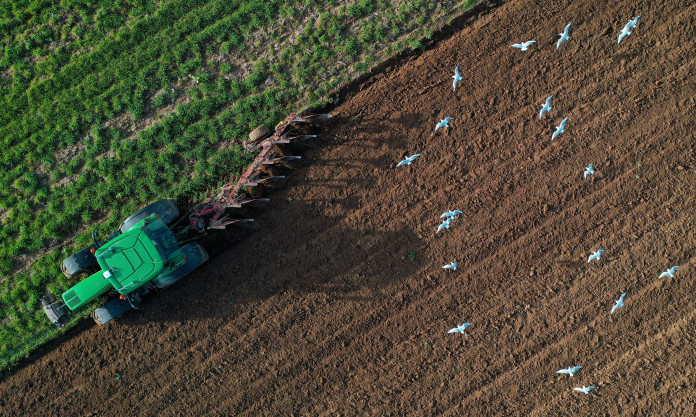In a groundbreaking move, a coalition of 32 investors overseeing a staggering $7.3 trillion in assets has come together to implore the G20 group of economically advanced nations to realign their agricultural subsidies in accordance with climate and nature objectives by the end of the decade.
This unprecedented call unveiled in a statement reviewed by Reuters, marks the investors’ inaugural joint endeavor to address global subsidies and their consequences. Notable members of this coalition include Legal & General Investment Managers, the largest asset manager in Britain, and the fund division of BNP Paribas. This appeal comes just before an impending G20 summit scheduled for September in India.
The investors’ collective intervention signifies a pivotal step in addressing subsidies that adversely affect the environment. This effort expands beyond a narrower request made in 2021 to the European Union, reflecting growing concerns about the potential risks to investment portfolios due to a lack of decisive action. The United Nations underscored the problem in a 2021 report, revealing that approximately 87% of the annual $540 billion allocated in agricultural subsidies contain measures that distort market prices and could harm nature and human health.
Furthermore, a significant 2021 UK study evaluating the economics of biodiversity disclosed that these subsidies contribute to a staggering $4-$6 trillion worth of damage to nature annually.
While a comprehensive global accord was reached in Montreal in December, encompassing biodiversity preservation and subsidy reform, the investors emphasize the urgency for wealthier nations to take prompt action.
Helena Wright, the policy director at the FAIRR Initiative, an assembly of investors overseeing $70 trillion with a focus on agricultural matters—emphasized the necessity for G20 countries to lead by example and fulfill their commitments, ultimately benefiting the climate and the environment.
To rectify this critical issue, the investors advocate for governments to link financial support for the agricultural sector with their environmental responsibilities, including adherence to the Paris Agreement on climate change and the commitment to safeguard biodiversity.
Their proposals further encompass redirecting incentives toward sustainable agricultural practices, eliminating subsidies for high-emission products like dairy and red meat, and increasing funding to support workers affected by this transition. According to Rachel Crossley, head of stewardship for Europe at BNP Paribas Asset Management, a comprehensive food system transformation is imperative, as it currently ranks among the most environmentally damaging systems.
Established in 2016, the FAIRR Initiative operates as a comprehensive platform providing vital data, research, and advocacy campaigns aimed at addressing the challenges and prospects within the food sector. One of its most notable achievements was its successful advocacy for the United Nations Food and Agriculture Organization to develop a global roadmap for the food industry until 2050. This roadmap’s results are poised to be unveiled during the COP28 climate conference in Dubai, slated for November.
Moreover, this coalition’s earlier call for G20 nations to publicly declare their targets for reducing agricultural emissions in alignment with national net-zero strategies was adopted by the hosts of COP28. These hosts, however, face scrutiny and reservations from critics who assert that the United Arab Emirates (UAE) is not a suitable location to host COP28 due to perceived shortcomings in their commitment to addressing climate change.
Concerns Over UAE’s Suitability to Host COP28
Amidst the discussions surrounding the 28th Conference of the Parties (COP28), slated to take place in Dubai, concerns have emerged over the United Arab Emirates (UAE) suitability as the host country. Critics argue that the UAE’s stance on climate change and its heavy reliance on fossil fuels raises questions about its seriousness in addressing climate complications.
One of the primary concerns is the UAE’s commitment to climate action. While the country has made certain strides in adopting renewable energy sources and implementing sustainable initiatives, skeptics point to the UAE’s continued reliance on fossil fuels. The UAE possesses one of the world’s largest oil reserves, and this dependence on oil not only contradicts the broader goals of climate action but also raises concerns about the sincerity of the country’s commitment to decreasing greenhouse gas emissions.
Furthermore, environmental advocates have raised alarms about the UAE’s hosting of COP28 in the context of its broader environmental policies. The country’s high levels of per capita carbon emissions, coupled with its substantial ecological footprint, have drawn criticism from international observers. These concerns are exacerbated by the UAE’s significant investments in large-scale infrastructure projects and luxury tourism, which can strain local ecosystems and exacerbate environmental challenges.
In conclusion, while the UAE’s selection as the host of COP28 has generated excitement and anticipation, it has also prompted valid concerns from environmentalists and climate advocates. The nation’s ongoing reliance on fossil fuels and potential gaps in its commitment to addressing climate change raise pertinent questions about its suitability to lead international discussions on such a crucial matter.






